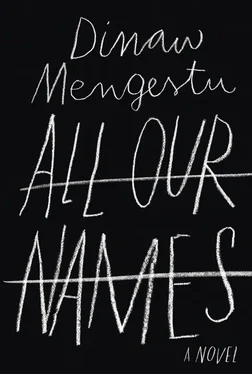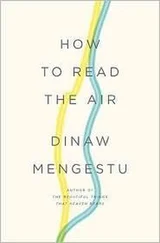Before getting back on the highway, I studied the map; my plan had been to drive straight and then turn north, but I decided now we were better off leaving the southern part of the state as soon as possible. Without telling Isaac, I decided we would go north first, and then cut across.
“Chicago,” I said. I thought of Isaac and me at the Knickerbocker Hotel with the ghost of Al Capone. We were the outlaws now.
We reached Chicago shortly before dusk. We drove along the lakeshore. I wanted to find the Knickerbocker Hotel but had no idea how to.
“It’s not fair,” Isaac said.
“What?”
He pointed out the window to the lake.
“You have oceans even in the middle of the country.”
“It’s not an ocean,” I said.
“I know,” he said. “Your lakes are my ocean. My forest is your jungle. America is a world, not a nation.”
We slowed to a crawl just as Chicago came into view. I had never been in a city anywhere near that size; I had never seen so many cars. I grew anxious thinking about how many people there must have been inside them. I felt like we were driving into something alive, with white gleaming spires on top of its buildings for teeth.
Every time we came to a complete stop, I turned to Isaac. He was enthralled by the view, as I suspected he would be.
He pointed to the tallest building we could see through the windshield.
“That must be the Hancock Center.”
He reached over and caressed my forearm. I took that as proof he had no idea what I was planning.
“This will be lovely,” he said.
There was no one along the path back to Joseph’s village. I expected that I would find traces of the war — more refugees, soldiers — but it was just as empty as it had been before. When I reached the band of houses that marked the town’s northern border, I heard the lorry engines approaching. Assuming Isaac was still alive, he would be back by now. I didn’t run, but I was desperate to see him again and walked as fast as I could while trying not to give the impression I was fleeing. When I reached the main road of the village, I saw that there were three lorries already parked, halfway in between the bronze fist and the Life Hotel. Dozens of soldiers were crowded into the beds of the first two. There was no crowd to greet them. The entire village had heard the engines and retreated indoors. The only truly communal knowledge was fear, and in this case everyone had the same response.
The soldiers descended from the back of the lorries; I was alone on the street watching them. The first to exit were clearly tired; they walked slowly and took time to regain their balance after landing, but they could do so on their own. That was true only for the first ones, however. Each group was more injured than the one that preceded it. There were the soldiers with minor wounds, cuts, and bruises across their chests and forearms, followed by those who had at least one limb badly injured — an arm in a sling, a thigh wrapped in bandages. Then, finally, came those who were almost dead, and those who might live but would suffer greatly for what little remained of their lives; all of these had to be carried out.
The third lorry was parked at the very edge of the road, under a large tree, just where the town began. There were no soldiers standing in the bed, but I could see through the slats part of a hand, a tuft of hair, boots, and patches of camouflage pants and shirts. A swarm of flies hovered over this truck, and I expected soon there would be vultures perched on the tree. I looked for Isaac among the living — the healthy and able-bodied, and then among the injured. I didn’t see him anywhere; I decided that if he was among the heap of dead bodies in the back of the last lorry, I didn’t want to know. I was prepared to accept his death, but not on those terms.
There is nothing left for me here, I told myself. I didn’t know where I would go, only that I would never see the capital again. I decided to head south along the main road, in the hope that I would be able to pick up a ride to another village. I made it a few feet before two soldiers stopped me. One pointed to the lorry full of corpses. I pretended not to understand what he meant, and was trying to walk away when the other soldier took hold of my arm and pulled me back.
“Do you think you are special?” he asked me.
I shook my head no. I recognized him from the hotel. He was one of the soldiers who, under Isaac’s orders, had taken the officer with the bulldog head away.
“Then why do you think you can leave? We go out there and fight for you, and now you want to leave.” He smiled, as if the problem had nothing to do with the dead but was an issue of manners.
He turned to the soldiers behind him and pointed to the houses on the other side of the road. Each soldier entered one home and emerged shortly after with all the men or teenage boys inside it. Suddenly I was no longer alone; there must have been at least fifty of us now. The soldier holding my arm pointed to the last lorry.
“Go,” he said. “And bury them.”
“Is Isaac in there?” I asked him.
He squinted his eyes in either confusion or anger; either way, he had no idea who I was talking about. He had never heard of Isaac. He knew him by a different name, as did all the soldiers.
“The captain,” I said.
He pushed me forward. I turned around to ask him another question, but he had already moved on; he had his hands around a young man’s neck and was leading him on like a dog.
The youngest boys were sent to dig the grave while the rest of us formed a chain from the back of the lorry to the ground, where the bodies were stacked one on top of another. I was in the bed with the bodies — the second link in the chain, with a man much older than me whose thin arms were still defined by the muscles of his youth. Like all the other men, he performed his job in silence, without pity and with perhaps even a bit of gratitude that this was all that was being asked of him. He took the legs and I took the arms of each body passed to us, which meant that, whether I wanted to or not, I had to stare into every face to see if it was Isaac.
After the second body, I stopped paying attention to the features. I looked as long as it took to know whether it was Isaac, and if the body was clearly shorter, taller, or heavier than Isaac, I didn’t look at all. I simply grabbed the stiff arms and passed them to the next pair of hands. After the fifteenth or twentieth, I decided to think of them as a single body named Adam. In my head I said, “You were a brave soldier, Adam.… Your mother and father will miss you.… You should have stayed in your village, Adam.… You had no reason to come here.… You could have gone to school and become a doctor, Adam.” And when I ran out of alternate endings, I simply thought, “Adam, Adam, Adam, Adam, Adam, Adam, Adam, Adam, Adam, Adam, Adam, Adam, Adam, Adam, Adam, Adam, Adam, Adam, Adam, Adam, Adam, Adam, Adam,” until we had carried the last body out of the lorry, and I could risk a small breath of relief: though there were more than a hundred Adams, there wasn’t a single Isaac.
We pushed all of the bodies into the long shallow grave on the other side of the tree, facing away from the village. We took turns shoveling the earth back. When we were finished, the only priest in the village was brought from his house to say a prayer over the grave. He was a short, stout man dressed in black with a purple collar. He said his prayer without any devotion, as if he had either long ago lost his faith or didn’t believe those men were entitled to share in it. Either way, when he was done, so were we. The soldiers who had been guarding us walked away as if they had finished watching a street performance that had only mildly held their interest to begin with. I thought I was done as well, and was going to continue walking south, as I had originally planned; but the second of the two soldiers, the one who had only pointed to the lorry without speaking, told me that the colonel was waiting for me in the hotel. I followed him into the courtyard, which was full of injured men lying on the ground, their open wounds festering in the sun. The soldier pointed up to the northwest corner of the balcony.
Читать дальше












